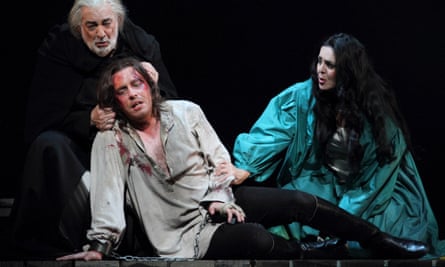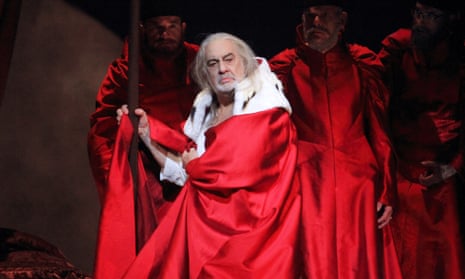The Royal Opera’s new production of Verdi’s I Due Foscari, an import from Los Angeles, forms its latest vehicle for Plácido Domingo, and he is, unquestionably, rather fine in it. Tragic Francesco Foscari – a high-minded, weak-willed Venetian Doge, conned into believing his son Jacopo guilty of murder – suits him better than some of the other baritone roles he has recently undertaken.
There are, it is true, a few moments when his tone thins in his lower registers. But elsewhere that familiar bronzed sound rings out superbly, and his characterisation is nicely detailed – a carefully observed portrait of a man whose adherence to the letter of the law makes him catastrophically blind to the demands of genuine justice.

The rest of it, however, is disquietingly hit and miss. There’s strong conducting from Antonio Pappano, and the dark-hued score, all sombre brass and low strings, is excitingly played. Tenor Francesco Meli makes an appealing if unsubtle Jacopo, though Maria Agresta, as his distraught wife Lucrezia, is wild and wordless throughout.
No one is helped, however, by Thaddeus Strassberger’s ill-focused staging. The set, all rubble and gantries, is out of Piranesi’s Carceri, while the costumes are all-purpose 15th-century dictatorial, reminiscent of Ivan the Terrible’s Russia and the Ottoman empire as well as Renaissance Italy.
There’s a lot of meaningless processional to-ing and fro-ing. Interpolated torture scenes fail to chill the marrow. Meli has to sing his arias trussed up or lying in a cage swinging precariously from the flies, while Lucrezia, in a departure from Verdi’s original intentions, goes mad at the end and distractingly tries to drown one of her children during Domingo’s final aria.
The great man doesn’t disappoint, but ultimately this isn’t Covent Garden’s finest hour.
In rep until 2 November. Box office: 020-7304 4000. Venue: Royal Opera House, London.

Comments (…)
Sign in or create your Guardian account to join the discussion